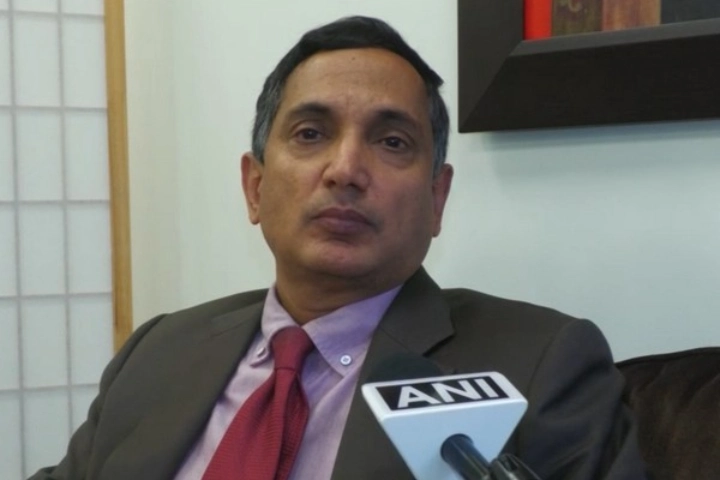

Krishna Srinivasan, IMF Director, Asia and Pacific Department (Photo: ANI)
India is on a sustained growth path driven by consumption and public investments, India’s economic performance stands out against a backdrop of global uncertainties said Krishna Srinivasan IMF Director, Asia and Pacific Department in an Exclusive interview to ANI.
“Growth at 6.8% in 2024-25 is an impressive number. And this is largely led by private consumption and public investment” said Srinivasan
Srinivasan says India has successfully navigated from the multiple shocks in the past starting from pandemic to recent tensions in gulf. While acknowledging India’s growth potential, he also underscored the need for reforms in India to fully capitalize on demographic advantages. Emphasizing significant investment in education, healthcare, changes in labour laws, and business environment, he highlighted the imperative of collective efforts of centre and states to ensure India realizes its economic potential.
“I would highlight now, India is a young growing population we are likely to add about 15 million people to the labour force every year. This if you want to benefit from this demographic change, you will need lots of reforms. I think in particular, I would emphasize the need for significant investment in education, healthcare, so that this growing labour force can contribute productively to the economy” he said.
He further added “I think India also needs to liberalize its trade regime to remove restrictions so that firms can compete. Well. You have to make the environment more attractive for FDI”.
Srinivasan also stressed the importance of reforms in India to sustain growth rates comparable to or even surpassing China’s. He acknowledged India’s status as the fastest-growing economy, outpacing China, albeit with the recognition of China’s significantly larger scale.
“China is more than four times bigger than India. Medium term good prospects for India are pretty good at 6.5%. It can do better than that. But all it impinges on the reforms India pursues. If it can get hearts and minds together and embark on reforms, then India could get the 6.5% or more over the next several years,” he said.
Addressing concerns about overstated GDP growth, he expressed confidence in India’s national accounts statistics while acknowledging ongoing efforts by the Indian government to improve data quality and transparency.
“I think the Indian government is working actively in trying to fix the quality and try to improve the quality of statistics. And, you know, they’re focusing on trying to get better estimates of sectoral data, trying to do surveys of income and income exponential households, and, and businesses,” he said.
While acknowledging the significant role of public investment in driving post-pandemic growth, he noted the tepid pace of private investment. India’s reforms aimed at improving the business environment are seen as crucial for stimulating private investment and unlocking India’s full growth potential.
“Indian government has invested a lot in terms of Capex spending, addressing the infrastructure needs whether it’s rail, roads, airports and so on. The amount the Indian government has spent on this has led to a narrowing of the infrastructure gap, ” he said.
“Over the last several years, bad balance sheets have been cleaned up and corporates have deleveraged, so in some sense, corporates are now well placed in terms of their own investment and financing for the investment. Going forward, private investment will pick up at a much faster pace” he further added.
India’s achievements in digital infrastructure, particularly initiatives like Digital Public Infrastructure (DPI), were hailed as exemplary. Srinivasan highlighted the potential for India to leverage its technological advancements for global benefit, emphasizing the importance of openness and interoperability in maximizing the impact of digital initiatives.
“This (Digital Public Infrastructure) is a very development in Indian landscape. DPI will raise productivity in India by fostering innovation and competition. It’s going to improve financial inclusion and very importantly the efficiency of public sector. These are factors which are given and I think it’s really impressive” he said.
Srinivasan said that IMF will release a comprehensive report in Singapore, offering insights into global economic developments and their implications for countries like India. The report will delve into factors guiding growth, spillovers from China, corporate risks, and more, providing valuable guidance for policymakers and stakeholders.
As India continues to get World support against the Pahalgam Terror attack that killed 26…
Union Minister of Industry and Supply Piyush Goyal on Saturday highlighted the success of a…
In a display of outrage following the Pahalgam terror attack, thousands from the Indian community…
In a continued crackdown following the Pahalgam terror attack, security forces and Jammu and Kashmir…
In a massive statewide crackdown, over 550 illegal immigrants from Bangladesh were detained in Ahmedabad…
The Deputy Chief of the Main Operations Directorate of the General Staff of the Russian…